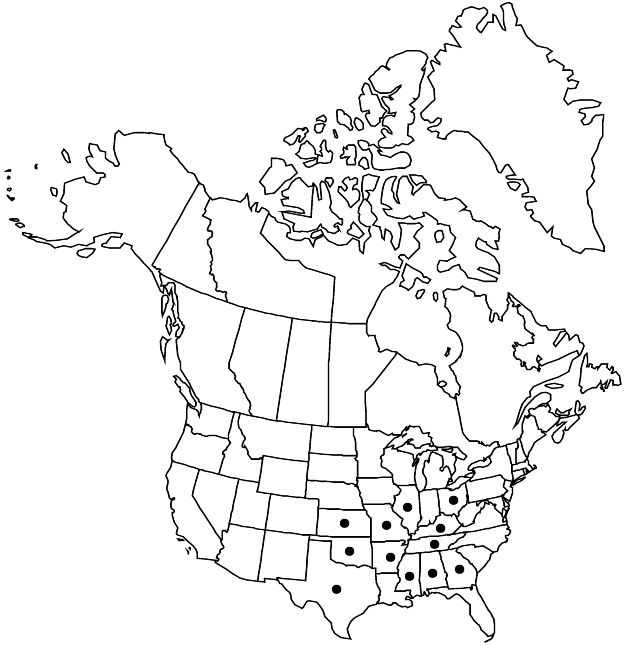Difference between revisions of "Sedum pulchellum"
Fl. Bor.-Amer. 1: 277. 1803,.
FNA>Volume Importer |
imported>Volume Importer |
||
| (5 intermediate revisions by 2 users not shown) | |||
| Line 5: | Line 5: | ||
|title=Fl. Bor.-Amer. | |title=Fl. Bor.-Amer. | ||
|place=1: 277. 1803, | |place=1: 277. 1803, | ||
| + | }} | ||
| + | |special_status={{Treatment/ID/Special_status | ||
| + | |code=E | ||
| + | |label=Endemic | ||
}} | }} | ||
|basionyms= | |basionyms= | ||
| Line 10: | Line 14: | ||
|name=Chetyson pulchellum | |name=Chetyson pulchellum | ||
|authority=(Michaux) Á. Löve & D. Löve | |authority=(Michaux) Á. Löve & D. Löve | ||
| + | |rank=species | ||
}} {{Treatment/ID/Synonym | }} {{Treatment/ID/Synonym | ||
|name=Chetyson vigilimontis | |name=Chetyson vigilimontis | ||
|authority=(Small) Á. Löve & D. Löve | |authority=(Small) Á. Löve & D. Löve | ||
| + | |rank=species | ||
}} {{Treatment/ID/Synonym | }} {{Treatment/ID/Synonym | ||
|name=Sedum vigilimontis | |name=Sedum vigilimontis | ||
|authority=Small | |authority=Small | ||
| + | |rank=species | ||
}} | }} | ||
|hierarchy=Crassulaceae;Sedum;Sedum pulchellum | |hierarchy=Crassulaceae;Sedum;Sedum pulchellum | ||
| Line 40: | Line 47: | ||
-->{{#Taxon: | -->{{#Taxon: | ||
name=Sedum pulchellum | name=Sedum pulchellum | ||
| − | |||
|authority=Michaux | |authority=Michaux | ||
|rank=species | |rank=species | ||
| Line 54: | Line 60: | ||
|publication title=Fl. Bor.-Amer. | |publication title=Fl. Bor.-Amer. | ||
|publication year= | |publication year= | ||
| − | |special status= | + | |special status=Endemic |
| − | |source xml=https:// | + | |source xml=https://bitbucket.org/aafc-mbb/fna-data-curation/src/2e0870ddd59836b60bcf96646a41e87ea5a5943a/coarse_grained_fna_xml/V8/V8_405.xml |
|genus=Sedum | |genus=Sedum | ||
|species=Sedum pulchellum | |species=Sedum pulchellum | ||
Latest revision as of 22:43, 5 November 2020
Herbs, annual or perennial (by formation of side shoots), rarely biennial, multi-stemmed from base, glabrous. Stems ascending, simple or branched, sometimes bearing rosettes. Leaves alternate, spreading, sessile; blade pale yellow-green, not glaucous, linear to oblanceolate or spatulate, subterete, 5–32 × 1.5–5 mm, base sagittately short-spurred, not scarious, apex obtuse to rounded, (surfaces papillose in rosette). Flowering shoots erect, simple, 6–23 cm; leaf blades linear, base with 2 sagittate spurs (unique in this species); offsets not formed. Inflorescences cymes, 10–40-flowered, 3-branched; branches secund or recurved, not forked; bracts absent or similar to leaves, smaller. Pedicels to 1 mm. Flowers 4(–7)-merous; sepals erect, distinct, light green, linear-lanceolate, unequal, 1.3–5.8 × 0.5–1.5 mm, apex acute or obtuse; petals erect or subdivergent, distinct, white to purple, narrowly linear-lanceolate or elliptic-lanceolate, carinate and slightly channeled basally, 4–10 mm, apex acute or obtuse; filaments white or pinkish; anthers red or purple; nectar scales white, pinkish white, or yellow, square. Carpels spreading in fruit, distinct, light brown. 2n = 22, ca. 42.
Phenology: Flowering spring–early summer.
Habitat: Areas of flat rocks, especially openings in cedar glades, ledges of cliffs, and bluffs, in shallow soil or in living mats of moss on rocks, often on limestone, sandstone, and chert
Elevation: 90-500 m
Distribution

Ala., Ark., Ga., Ill., Kans., Ky., Miss., Mo., Ohio, Okla., Tenn., Tex.
Discussion
Sedum pulchellum is found in eastern North America from the Appalachian Ridge and Valley Province in northwestern Georgia and eastern Tennessee, westward through the southern Cumberland Plateau in northern Alabama and southeastern Tennessee, across the interior low plateaus of southern Illinois and central Kentucky and Tennessee, the till plains of Missouri, the Ozark plateaus of Arkansas and Missouri, and the Ouachita Mountains of Arkansas and Oklahoma, to the Osage Plains of Kansas, Missouri, Oklahoma, and Texas.
Selected References
None.